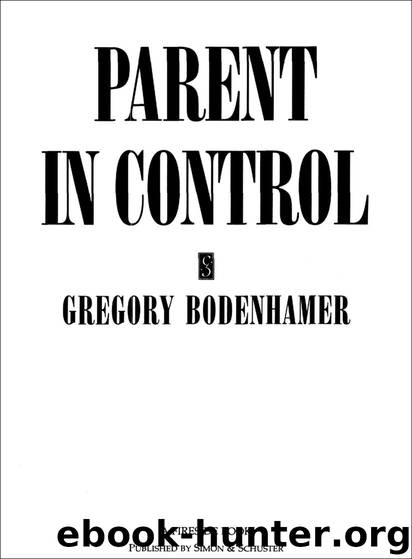Parent in Control by Gregory Bodenhamer

Author:Gregory Bodenhamer
Language: eng
Format: epub
Publisher: A Fireside Book
Published: 1995-07-15T00:00:00+00:00
7
HOW TO REGAIN CONTROL OF OUT-OF-CONTROL CHILDREN
If parents don’t consistently discipline their out-of-control children, who will?
If parents don’t consistently supervise their out-of-control children, who will?
If parents don’t consistently reach out to their out-of-control children with love, who else can?
The First Steps in Gaining Control
Children who have learned that violence is an effective means of getting their way will use violence until they are stopped. Chronic runaways who learn that they don’t have to obey any household rules if they aren’t at home will continue to run away until they are stopped. Children who are emotionally attached to powerful peer cliques and subcultures like street gangs, skinheads, punks, heavy metalers, alternative kids, and graffiti taggers draw enormous amounts of antiparent, antiauthority support from their peers. Until they are prevented from having any contact with these people, children will fight every parental attempt at regaining control. Of all of the things that parents must do to regain control, it is most important and most difficult to stop the violence, prevent the running away, and end the peer-group influence.
If your teenage children are violent, aggressive, and quick to lose their temper, if they hit or physically manhandle you to get their way, if they are chronic runaways, or if they are deeply involved in gangs or delinquent and incorrigible subcultures, please consider sending them to a well-structured, well-supervised wilderness program or residential treatment center, or participating in a Back in Control Parenting Workshop as a first step in regaining control.
Some types of misbehavior are obviously worse than others. If your children are involved in drugs, alcohol abuse, running away, crime, or gang activity, or if they are associating with destructive people, work on those problems before attempting to get them to clean their rooms, take out the trash, do their homework, or perform any other tasks or chores. If a sixteen-year-old girl’s primary problem is cutting school to hang out with her drug-using friends, don’t try to get her to clean her room or do her homework at this time. That will come later. Instead, work on keeping her in class, removing her from her negative peers, and providing day-to-day supervision based on her level of trust. In two or three weeks, after you have initially regained control, you may begin to work on household tasks and homework.
Also, before you work on anything, reread Chapter 5, “Provocation and Manipulation,” and practice handling your children’s attempts to overcome, dismantle, or avoid your discipline and supervision.
Download
This site does not store any files on its server. We only index and link to content provided by other sites. Please contact the content providers to delete copyright contents if any and email us, we'll remove relevant links or contents immediately.
Should I Stay or Should I Go? by Ramani Durvasula(7667)
The Lost Art of Listening by Michael P. Nichols(7506)
The Rosie Project by Graeme Simsion(6414)
Beartown by Fredrik Backman(5754)
We Need to Talk by Celeste Headlee(5615)
Ego Is the Enemy by Ryan Holiday(5448)
Hunger by Roxane Gay(4928)
Suicide Notes by Michael Thomas Ford(4827)
I Love You But I Don't Trust You by Mira Kirshenbaum(3875)
Mummy Knew by Lisa James(3691)
Not a Diet Book by James Smith(3426)
Crazy Is My Superpower by A.J. Mendez Brooks(3400)
Toxic Parents by Susan Forward(3292)
Girl, Wash Your Face by Rachel Hollis(3282)
The Complete Idiot's Guide to Coping With Difficult People by Arlene Uhl(3149)
The Social Psychology of Inequality by Unknown(3031)
Name Book, The: Over 10,000 Names--Their Meanings, Origins, and Spiritual Significance by Astoria Dorothy(2987)
The Hard Questions by Susan Piver(2975)
The Gaslight Effect by Dr. Robin Stern(2793)
